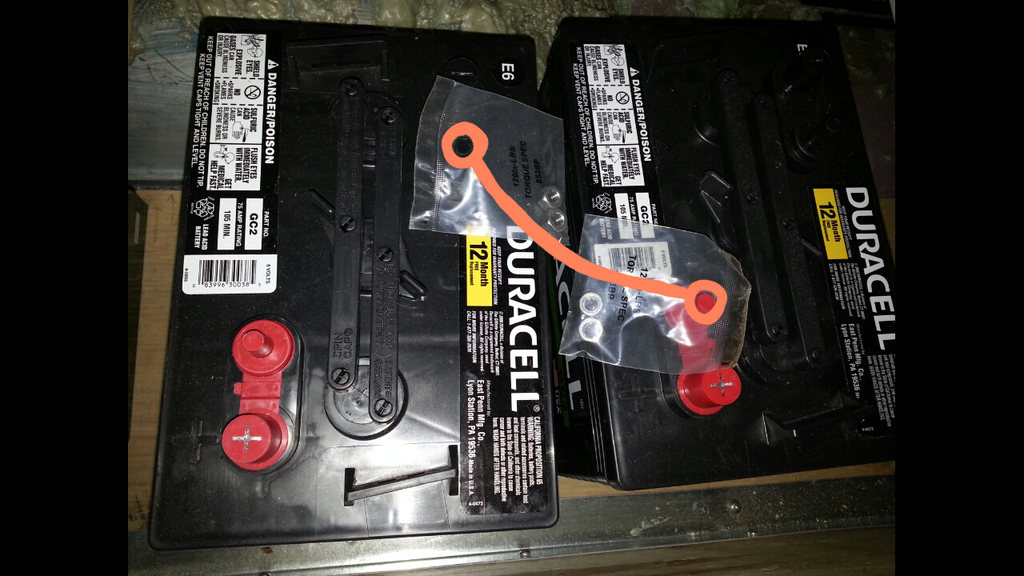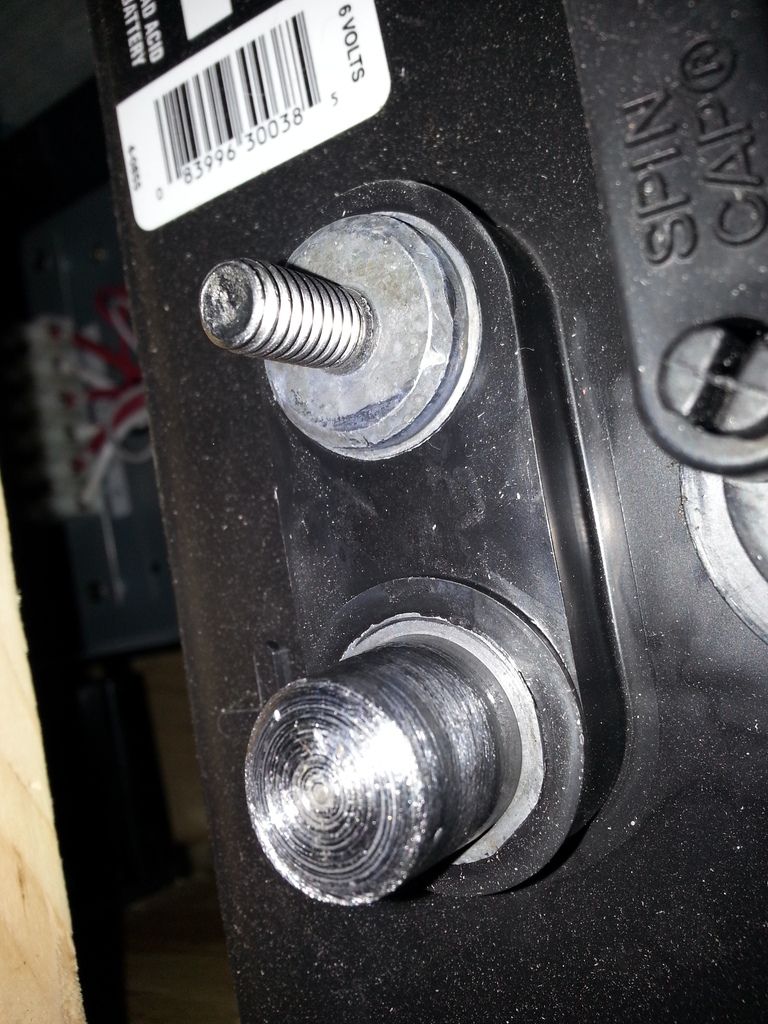- Good Sam Community
- Everything RV
- Technical Issues
- Golf cart batteries vs storage vs charging??
- Subscribe to RSS Feed
- Mark Topic as New
- Mark Topic as Read
- Float this Topic for Current User
- Bookmark
- Subscribe
- Mute
- Printer Friendly Page
Golf cart batteries vs storage vs charging??
- Mark as New
- Bookmark
- Subscribe
- Mute
- Subscribe to RSS Feed
- Permalink
- Report Inappropriate Content
Feb-23-2017 11:26 AM
Quick question for you today.
I'm building a campervan conversion out of a Ford E250 high top van.
I'm new to all of this and it's my second year of building this thing (part time)
I live in canada but I order a lot of equipment online in the USA and I have it delivered near the border then I go down to get it.
I did that a couple of times now and I saved a lot of money (even if the exchange rate is not good for us)
Most of the equipment is just sitting there in my garage with my campervan waiting for installation.
Among the equipment, I have two 6 volt GC2 golf cart acid batteries that I bought at Sam's club in July (summer 2016)
https://www.samsclub.com/sams/duracell-golf-car-battery-group-size-gc2/prod3590228.ip
I wanted to know if it's ok to leave them there until I hook them up? or do I need to put a trickle charger/smart charger on them?
My garage is not heated but it is connected to the rest of the house so it's around 50deg F most of the time, the coldest it will get is around 40deg F.
Thanks for any advice!
DIY conversion build, extended 2010 Ford 5.4L E250 + high top, from Montreal Canada, new to all this so please be patient and clear with me (never built or camped in a van yet)
- Mark as New
- Bookmark
- Subscribe
- Mute
- Subscribe to RSS Feed
- Permalink
- Report Inappropriate Content
Feb-25-2017 02:37 PM
evy wrote:
In order to plug the trickle/smart charger on the batteries I need to convert them to 12 volts, I need to buy a short wire to do so, is 4 gauge big enough? and which terminal do I use? the threaded one or the bigger one? from what I see on google image most people use the threaded one.
It's amazing that this project (5 months?) didn't end up in magnificent fireworks yet. Perhaps a sheer luck.
Yes, 4 gauge is big enough. 14 or 18 gauge will be sufficient. Any piece of old lamp cord. Terminal type doesn't matter, for this application.
For eventual use on a camping, that #4 cable from Canadian Tire will do.
- Mark as New
- Bookmark
- Subscribe
- Mute
- Subscribe to RSS Feed
- Permalink
- Report Inappropriate Content
Feb-25-2017 12:43 PM
evy wrote:
In order to plug the trickle/smart charger on the batteries I need to convert them to 12 volts, I need to buy a short wire to do so, is 4 gauge big enough? and which terminal do I use? the threaded one or the bigger one? from what I see on google image most people use the threaded one.
For the trickle charger, pretty much any wire will do fine since the current is small (an amp or two at most). Look at the size of the wires from the trickle charger for a rough minimum guideline.
For eventual use in your van, the interconnect wire should be sized based on the current required by the van (or put out by the converter) in the worst case. Basically, that boils down to having it be the same size as the ground wire and the positive wire, assuming there's only one positive wire connected. 4 gauge would probably be fine if you don't have a large inverter. One or two gauge ought to be sufficient in most any case.
It doesn't really matter which terminals you use; whatever works for the terminations on the connecting wire. Most do use the wing nuts because most RVs have wires with ring terminals on them. The posts may be a little more secure if you have the proper size of clamp for the post, but both are satisfactory.
- Mark as New
- Bookmark
- Subscribe
- Mute
- Subscribe to RSS Feed
- Permalink
- Report Inappropriate Content
Feb-25-2017 12:31 PM
Almot wrote:
A good trickle charger wouldn't hurt. Better than leaving them disconnected for 7 months of winter. Montreal is not a North Pole, I suspect that of those 7 months only 2 or 3 months the temperature dropped below 50F and/or didn't stay below 50 all day. With cheap chargers rarely being good, I would still check the voltage once a month or so.
Good point. A trickle charger would be good idea where the OP is at.
We don't experience tropical temperatures here in the Alberta foothills in the winter like they do in Montreal.
- Mark as New
- Bookmark
- Subscribe
- Mute
- Subscribe to RSS Feed
- Permalink
- Report Inappropriate Content
Feb-25-2017 11:49 AM
Is this 15" wire suitable for the job?
http://www.canadiantire.ca/en/pdp/motomaster-switch-to-starter-battery-cable-4-gauge-0110961p.html#s...
https://www.samsclub.com/sams/duracell-golf-car-battery-group-size-gc2/prod3590228.ip?xid=plp3990117...


DIY conversion build, extended 2010 Ford 5.4L E250 + high top, from Montreal Canada, new to all this so please be patient and clear with me (never built or camped in a van yet)
- Mark as New
- Bookmark
- Subscribe
- Mute
- Subscribe to RSS Feed
- Permalink
- Report Inappropriate Content
Feb-25-2017 11:01 AM
- Mark as New
- Bookmark
- Subscribe
- Mute
- Subscribe to RSS Feed
- Permalink
- Report Inappropriate Content
Feb-25-2017 10:56 AM
- Mark as New
- Bookmark
- Subscribe
- Mute
- Subscribe to RSS Feed
- Permalink
- Report Inappropriate Content
Feb-25-2017 10:07 AM
I do the same with my 6's. Leave them on the trailer (disconnected) and fully charge them in October and then fully charge them in May. They are 7 years old. Just checked them a couple days ago they are at 12.98 V.
I also dry camp 99 percent of the time and never let them go below 60 percent SOC.
- Mark as New
- Bookmark
- Subscribe
- Mute
- Subscribe to RSS Feed
- Permalink
- Report Inappropriate Content
Feb-25-2017 09:30 AM
evy wrote:I have not had good luck with hydrometers, I have the one you posted and always got a reading of good or 1300. When I tested distilled water I still got the same reading. I also have the bulb type which I thought would be more accurate but was not. Some have told me I needed to buy a Freas to get an accurate reading, I just use a volt meter now. As to your second question If you fully charge your batteries you can leave them for several months until you get your system together. I have the same batteries and fully charge mine for the winter, disconnect then recharge in spring. I dry camp 95% of the time but never let them get below 50% SOC before recharging them. most cycles are much shallower and the batteries are 9 years old.
Hi everybody!
Quick question for you today.
I'm building a campervan conversion out of a Ford E250 high top van.
I'm new to all of this and it's my second year of building this thing (part time)
I live in canada but I order a lot of equipment online in the USA and I have it delivered near the border then I go down to get it.
I did that a couple of times now and I saved a lot of money (even if the exchange rate is not good for us)
Most of the equipment is just sitting there in my garage with my campervan waiting for installation.
Among the equipment, I have two 6 volt GC2 golf cart acid batteries that I bought at Sam's club in July (summer 2016)
https://www.samsclub.com/sams/duracell-golf-car-battery-group-size-gc2/prod3590228.ip
I wanted to know if it's ok to leave them there until I hook them up? or do I need to put a trickle charger/smart charger on them?
My garage is not heated but it is connected to the rest of the house so it's around 50deg F most of the time, the coldest it will get is around 40deg F.
Thanks for any advice!
- Mark as New
- Bookmark
- Subscribe
- Mute
- Subscribe to RSS Feed
- Permalink
- Report Inappropriate Content
Feb-24-2017 05:09 AM
http://forums.woodalls.com/index.cfm/fuseaction/thread/tid/29198695.cfm
690W Rooftop + 340W Portable Solar,4 GC2s,215Ah@24V
2016 Ram 2500 4x4 RgCab CTD,2507# payload,10.8 mpgUS tow
- Mark as New
- Bookmark
- Subscribe
- Mute
- Subscribe to RSS Feed
- Permalink
- Report Inappropriate Content
Feb-24-2017 04:47 AM
landyacht318 wrote:
Not in my opinion. I have one of those and could not get the same reading twice.
I like the OTC4619
https://www.amazon.com/OTC-4619-Professional-Battery-Hydrometer/dp/B0050SFVHO
Just do not throuw out the packaging and store it in there and Fragility is not an issue.
Guess I'm just clumsy, as I keep breaking these things.
Are the refractometers you see on Amazon any good?
This one is quite a bit more expensive but has good reviews:
https://www.amazon.com/Robinair-75240-Coolant-Battery-Refractometer/dp/B000HTNODE
690W Rooftop + 340W Portable Solar,4 GC2s,215Ah@24V
2016 Ram 2500 4x4 RgCab CTD,2507# payload,10.8 mpgUS tow
- Mark as New
- Bookmark
- Subscribe
- Mute
- Subscribe to RSS Feed
- Permalink
- Report Inappropriate Content
Feb-23-2017 12:38 PM
I like the OTC4619
https://www.amazon.com/OTC-4619-Professional-Battery-Hydrometer/dp/B0050SFVHO
Just do not throuw out the packaging and store it in there and Fragility is not an issue.
- Mark as New
- Bookmark
- Subscribe
- Mute
- Subscribe to RSS Feed
- Permalink
- Report Inappropriate Content
Feb-23-2017 12:24 PM
https://www.napacanada.com/en/p/USE62230
DIY conversion build, extended 2010 Ford 5.4L E250 + high top, from Montreal Canada, new to all this so please be patient and clear with me (never built or camped in a van yet)
- Mark as New
- Bookmark
- Subscribe
- Mute
- Subscribe to RSS Feed
- Permalink
- Report Inappropriate Content
Feb-23-2017 11:42 AM
Batteries self discharge, and they have shelf lives.
They self discharge more with age, and with higher temperatures.
YOu should fully charge them and then Ideally perform an Equalization charge, if the cells do not all read 1.275+ on a Hydrometer.
Equipment and processes for doing this have been discussed in depth dozens of times on this forum.
I have a freind who once purchased high$$ AGM batteries and never put them into use. Years later, he kept muttering they were brand new and never used, yet the voltmeter and charging sources proved theses new batteries were sulfated and worth only their weight in lead.
Sadly this did not prevent him from repeating the unwise decision, and I go there with my charger every month and top them up, but they are now over 2 years old. 800$ worth of top quality battery wasting away, slowly. They'd be near useless if I did not top them up regularly. they are due now.
- Mark as New
- Bookmark
- Subscribe
- Mute
- Subscribe to RSS Feed
- Permalink
- Report Inappropriate Content
Feb-23-2017 11:32 AM
beemerphile1 wrote:
...they have been sulfating ever since.
I'm guessing that's a bad thing :S but how bad? Did I damage them in a way that they will have less cycle life?
DIY conversion build, extended 2010 Ford 5.4L E250 + high top, from Montreal Canada, new to all this so please be patient and clear with me (never built or camped in a van yet)





